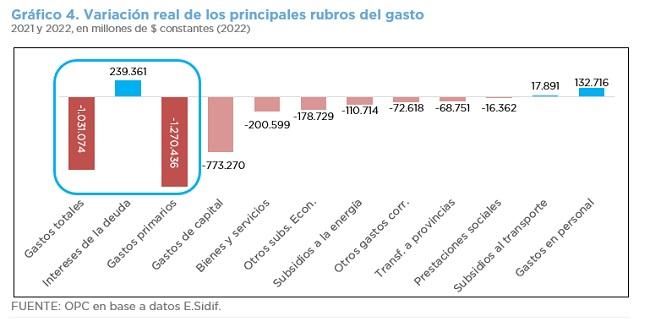During 2022, the primary and financial deficits were reduced with respect to the previous year, in relation to the Gross Domestic Product. To a large extent, the result was driven by a cut in primary expenditures, which reached 7.4% in the year-on-year comparison
- On the other hand, the economic deficit reached 4% of GDP, higher than in the previous year.
- The largest declines in primary expenditure were recorded in capital expenditures (37.6% YoY), goods and services (30.2% YoY) and economic subsidies (11.3% YoY).
- Personnel expenses grew by 8.5% in real terms and pensions by 0.3%, basically due to the compensatory bonuses for the lowest benefits and the increase in the number of beneficiaries.
- Pension benefits adjustments during the year were below inflation (62.7% YoY vs. 72.4% YoY) due to the application of the mobility formula.
- In the last three years, expenditure on social programs increased by 1.2 percentage points of GDP, basically due to the increase in the number of beneficiaries.
- Capital contributions to Aerolíneas Argentina (ARS72.908 billion) decreased 33.5% YoY.
- Total resources fell 4.2%, basically because of lower collection of the Solidarity Contribution and SDRs.
- Tax and Social Security revenues increased by 4.0% YoY and 4.1% YoY, respectively.
- Export duties accounted for 17% of tax revenues: prices of soybean products rose, although sales abroad did not grow in real terms.
- Collection of the Tax for an Inclusive and Solidarity-based Argentina increased by 80.1%.
- Current appropriations increased by 68.2% during the year: interest on debt and social expenditures rose above this annual average.
- Thirteen budget amendments were made, two by Necessity and Urgency Decree (DNU), which increased the financial deficit.

